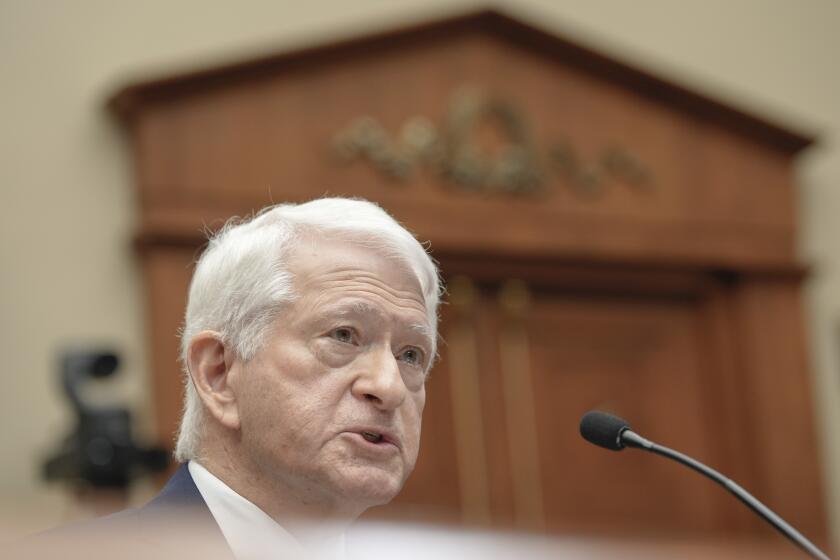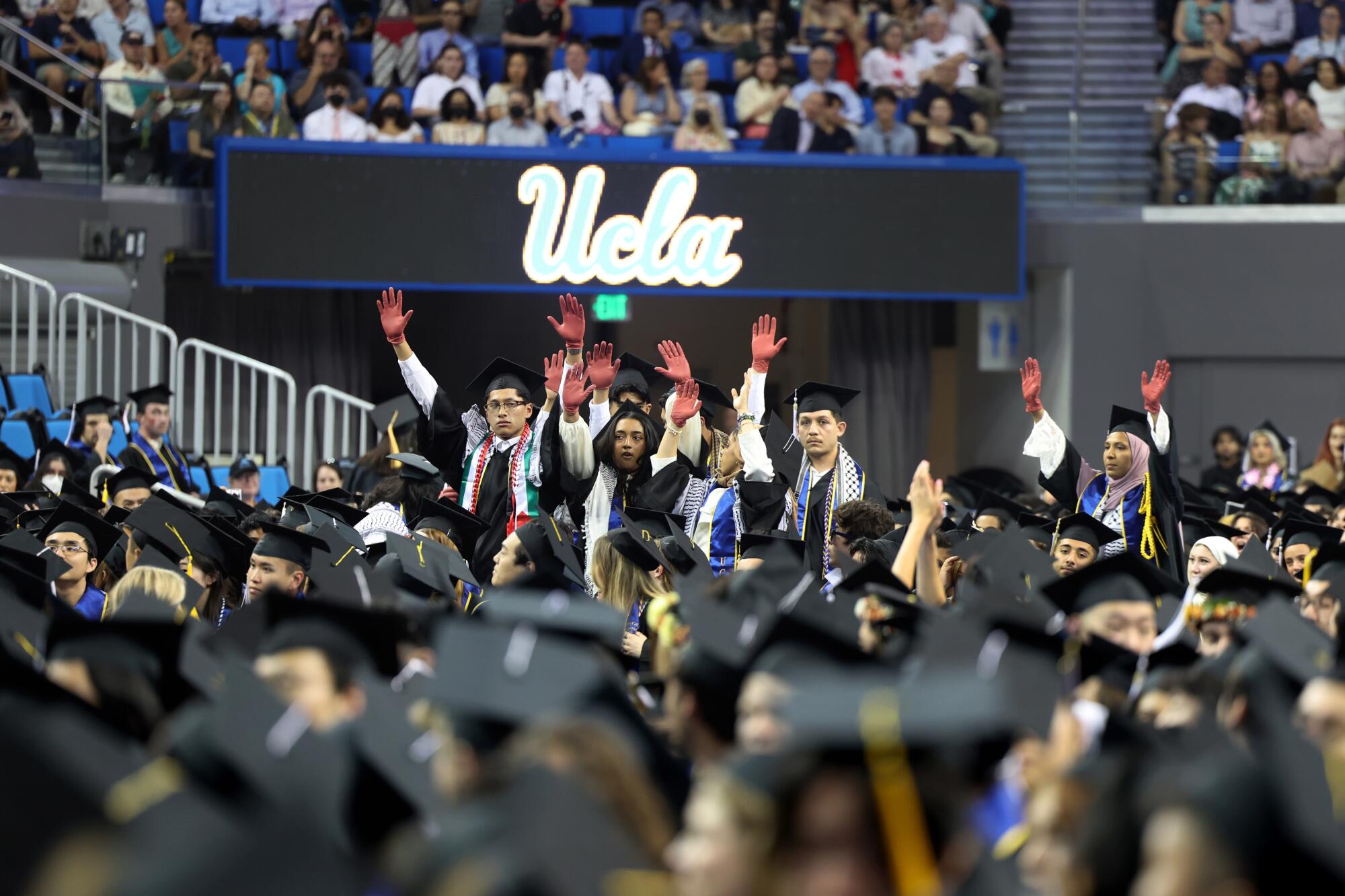
UCLA’s largest commencement ceremonies kicked off Friday mostly devoid of protests — but punctuated by short demonstrations, chants and a pro-Palestinian walkout at one event — as thousands of students received degrees after a tumultuous educational journey through a global pandemic, labor strife and political polarization.
More than 26,000 people, including 6,600 graduates, gathered at Pauley Pavilion arena for three ceremonies into the evening for the College of Letters and Science, the biggest commencement events out of more than 70 that will take place through Monday.
After nearly two months of campus tensions amid pro-Palestinian student activism, no large-scale protests materialized. There were moments of chanting for “free Palestine” and the waving of Palestinian and Israeli flags at the arena during one afternoon ceremony. A third evening commencement ceremony went off without disruptions.
The largest protest Friday occurred at the Luskin School of Public Affairs morning ceremony, where dozens of graduates wore kaffiyeh scarves in support of Palestinians and all three student speakers decried the violence in Gaza and UCLA leadership. A group of students walked out, before their diplomas were conferred, onto the grassy Dickson Court — the same place where police dismantled a pro-Palestinian encampment more than a month ago — and held a mock graduation. The formal Luskin event, which bestowed degrees to 295 graduate students, was among the smaller celebrations of the day.
Republicans questioned UCLA Chancellor Gene Block and the presidents of Northwestern and Rutgers university on the their handling of pro-Palestinian encampments, including UCLA “checkpoints” put up by protesters that prevented people they identified as Zionists from entering a camp.
Notably absent from Pauley Pavilion ceremonies Friday was UCLA Chancellor Gene Block, who typically speaks at the main commencements, including last year’s. Block, who is stepping down July 31, has come under intense criticism for his administration’s response to protests. A university official said he wanted to “keep the focus on students.” UCLA Executive Vice Chancellor and Provost Darnell Hunt — who will be interim chancellor before University of Miami President Julio Frenk takes over the permanent role — also did not appear on stage at Pauley Pavilion.
But overall, a festive and joyful atmosphere prevailed throughout the day for tens of thousands of graduates and visitors. Streams of black-gown-clad students and faculty members — and their loved ones in blue-and-gold accented suits and dresses reflecting Bruin colors — filed into graduation venues.
Anthony Contreras, 36, clutched a bouquet of red roses for his girlfriend, Sarai Buruel, who graduated with a master’s degree in social work. “It’s so exciting,” said Contreras, who was on campus with eight members of Buruel’s family. “I’ve never been to a graduation ceremony at UCLA before.”
Jack Lin, a senior graduating with a degree in computer science, attended the Pauley Pavilion event with friends to watch his girlfriend, Audrey, graduate. Lin, whose Henry Samueli School of Engineering and Applied Science ceremony is set for Saturday in the same building, said he had been distraught over the last two months as protests, violence and the union strike upended the campus.
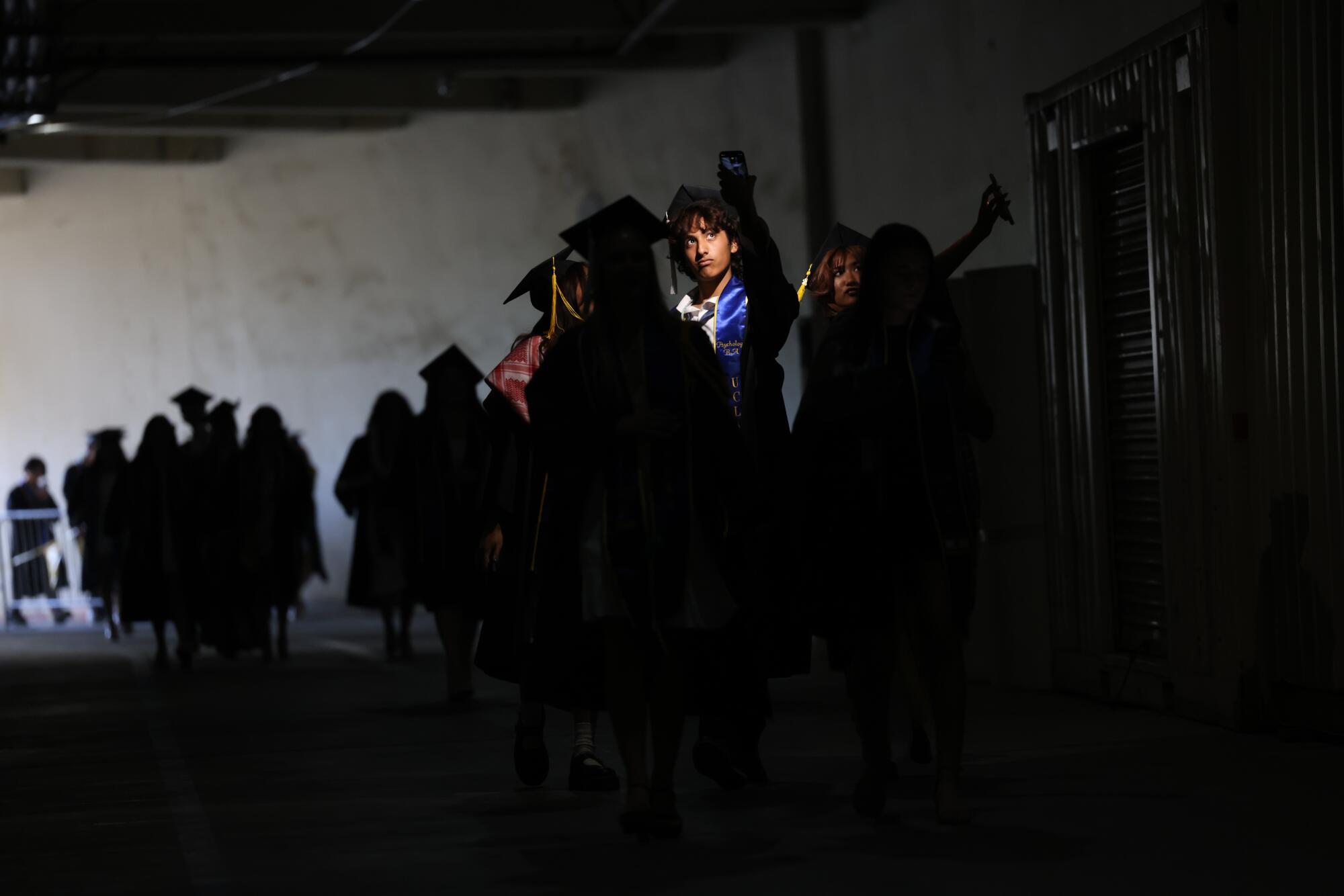
“We were a little worried there might be no graduation because our parents planned to fly in from Taiwan,” said Lin, of Chino Hills. “So we’re excited it still happened.”
As most students celebrated their milestone moment with excitement — sporting colorful leis and brightly decorated mortar boards — a few student speakers expressed anger and grief over campus tensions that have pushed UCLA into the center of national controversy over policing, vigilante violence, pro-Palestinian protests and accusations of antisemitism.
Speaking at the Luskin ceremony, Sebastian Cazares, who graduated with a master’s degree in public policy, criticized the administration for turning UCLA into “a war zone” and enabling “police brutality” against students and faculty. But he also expressed optimism about the future of his fellow graduates in creating more “equity and righteousness” in the world.
“I have renewed hope in the students here who join a historic international movement for change in the greatest college antiwar activism seen since Vietnam,” Cazares said. “Every past moment of grave injustice and humanitarian tragedy historically always will lead to an equal reaction of transformational justice.”
During the mock graduation ceremony for students who walked out of the Luskin gathering, Ananya Roy, a Luskin School professor of urban planning, social welfare and geography, addressed the small crowd. She commended the students, faculty members and their loved ones for “standing up for the truth” as private security guards watched from yards away.
“I’m in awe of the courage you all have shown today,” Roy said. “Our words matter and I know you will continue to lead us toward the horizon that is decolonization and abolition. Free Palestine! Cops off campus!”
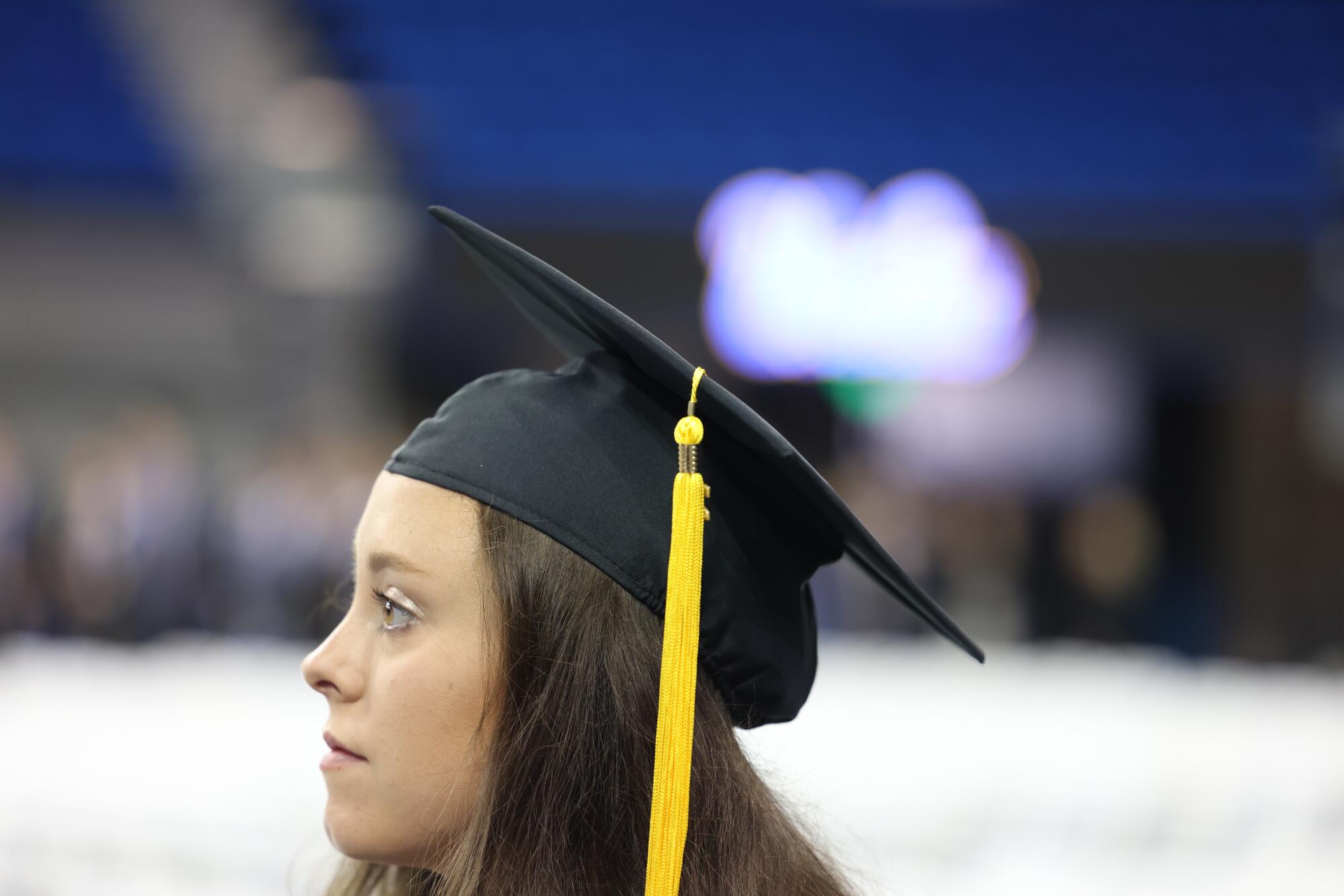
The bold Luskin scene stood in contrast to events a short walk away inside Pauley Pavilion, where protests were short-lived.
There, many students danced, high-fived and shouted in celebration as they appeared in camera shots beamed on a big screen. Dozens of students wore kaffiyehs. At least two decorated their caps with the phrases “free Palestine” and “free them all.”
Speaking from the stage, Melissa Nessman, the director of UCLA’s transfer alliance program, directed students to avoid disruptive behavior.
“Refrain from actions that disrupt or prevent speakers from being heard,” said Nessman, who is also the chief of college commencement. She said that “we recognize and value freedom of expression” but suggested that commencement was the wrong venue for activism.
Banners and flags were banned from the arena — as they were last year — but a small number of students and audience members sneaked in Israeli and Palestinian flags.
One brief but tense moment took place during the afternoon event, when more than a dozen students seated near the back raised their hands — clad in red translucent gloves as a sign of protest — and held up Palestinian flag-colored sashes and Palestinian flags. There were cheers as well as boos from the crowd. A student near the front row stood up on his chair to unfurl an Israeli flag and waved in the direction of the pro-Palestinian students.
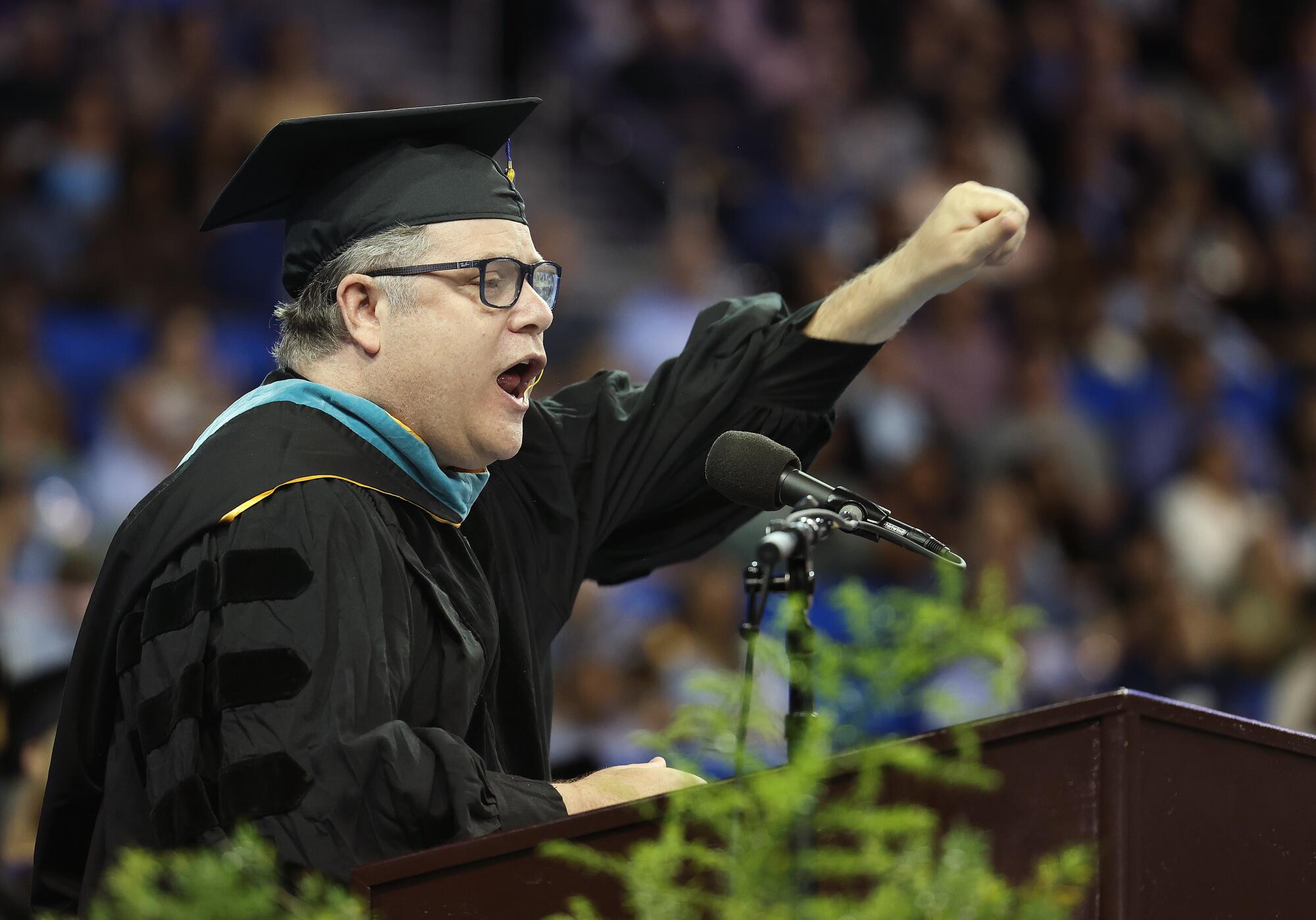
In his commencement speech at the three ceremonies, actor and UCLA alumnus Sean Astin broadly criticized activists.
“We must protect each other. We are a team. But it’s hard to remember at any given moment because we are filled with moral outrage and political animus, he said.
He also criticized the university.
“The UC system, UC administration has been too far out of touch with our students, our faculty, our academics, our researchers, our unions,” Astin said to cheers.
After Astin’s speech ended, the same pro-Palestinian students again stood up, chanting for a “free Palestine.” Some audience members did too. One man in the audience responded by yelling “U.S.A.! U.S.A.” as a handful of people joined him. There were also a few boos. The chants and response briefly drowned out a speaker on stage.
Mary Osako, vice chancellor of strategic communications, described the first main UCLA ceremony as “poignant and simply beautiful.” She said the absence of disruptions at it “illustrates our students’ unified desire to mark this moment as a sole celebration of their success.”
It was a viewpoint that Meghan Buddy, who graduated with a degree in molecular cell and developmental biology during the morning Pauley Pavilion celebration, shared.
“It’s definitely been an unusual year, but that has always been the case for us because we began school during COVID,” Buddy said. “Even if commencement was disrupted, I’d still be happy because I’m here, able to celebrate graduation and be with everyone.” Buddy, whose parents flew in from Michigan, said she planned to move to Salt Lake City to work as a research scientist at the University of Utah.
More than 15,000 UCLA graduates will receive degrees during graduations through the weekend.
Several ceremonies were to take place at Royce Hall, one of the oldest campus buildings, which is adjacent to the central green where a pro-Palestinian encampment went up April 25. Law enforcement arrested more than 200 activists there on May 1 after a night of mob violence against protesters.
The attack is the focus of internal and external investigations because of an hours-long delay in police response to quell the violence, a failure that led to the removal of UCLA’s then-police chief and the creation of a new Office of Campus Safety.
UCLA has faced multiple demonstrations since then as pro-Palestinian activists have demanded that the university end its financial ties to weapons companies and Israel — including two short-lived encampments. The most recent one on Monday night ended with 25 protesters under arrest and ordered to stay away from campus for two weeks.
Questions of antisemitism and anti-Muslim sentiment have also been an issue. Block faced hostile questioning last month by a congressional committee over complaints about rising antisemitism on campus; several Jewish students have sued the university over accusations of pro-Palestinian protesters illegally restricting campus access, and the U.S. Department of Education in December announced a civil rights investigation into UCLA.
Some faculty members boycotted UCLA’s traditional ceremonies.
Graeme Blair, an associate professor of political science and member of the Faculty for Justice in Palestine group, said he did not attend on Friday in protest of UCLA’s treatment of pro-Palestinian protesters.
Instead, Blair joined graduating student activists at an alternative ceremony for the “People’s University of the Liberation of Palestine” on Thursday at McCarty Memorial Christian Church in West Adams.
Blair said about 100 graduating students — in undergraduate and graduate programs — were present, as were dozens of faculty members and student supporters who were not graduating.
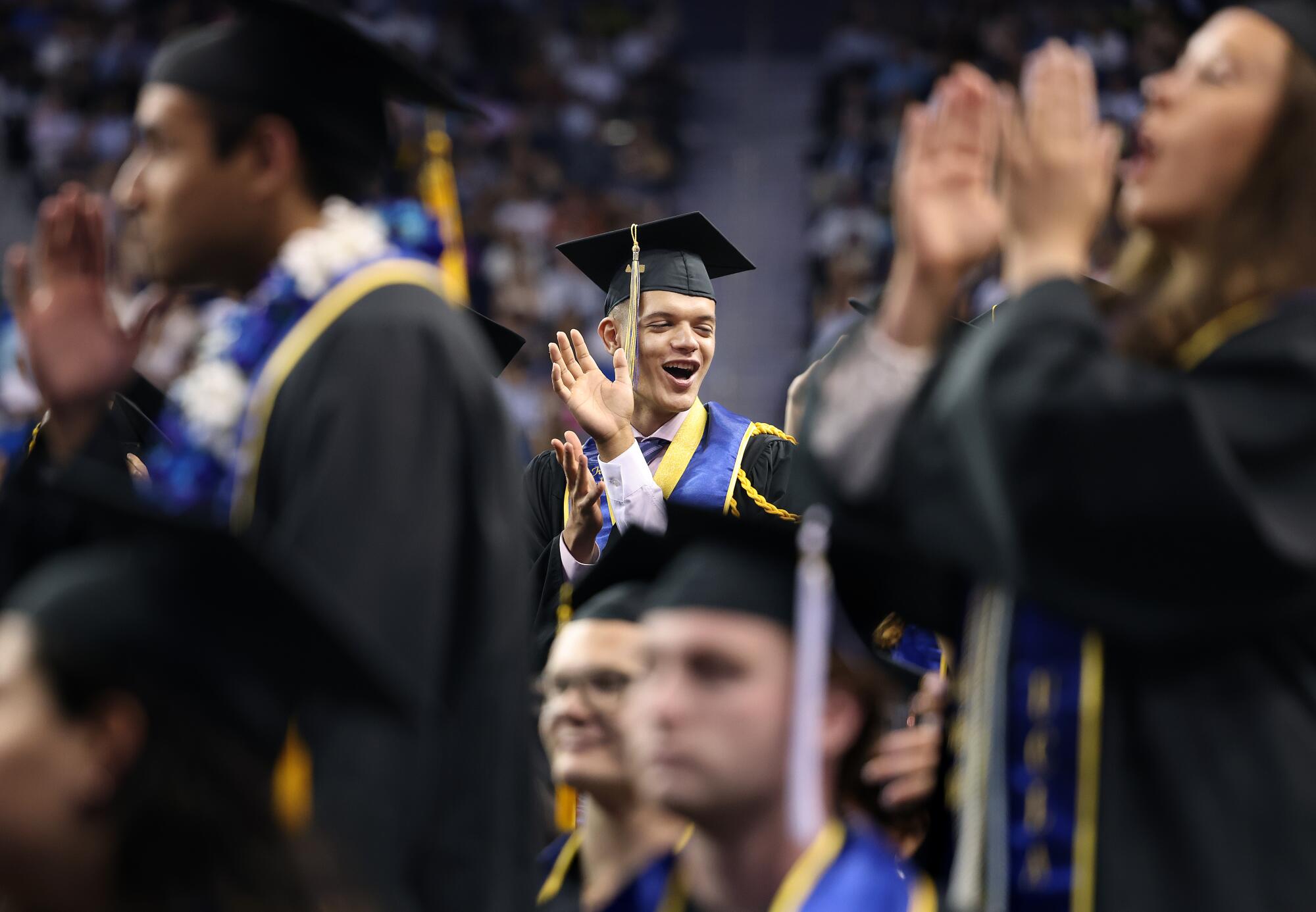
Blair said several of those graduating students were prevented from attending ceremonies on campus because of ongoing discipline proceedings from arrests, including the temporary ban from campus for students arrested during Monday’s protests.
UCLA is one of seven University of California campuses — from Davis to San Diego — celebrating commencement over the next few days. But ongoing flare-ups and controversy over pro-Palestinian protests have forced universities to put in place new security measures as they welcome tens of thousands of guests and graduates for a milestone moment of pride and accomplishment. That includes a new clear bag policy for all major events at UCLA.
A clear-bag rule is in place at UC San Diego, where the main events take place Saturday, while at UC Riverside, officials said clear bags are “preferred” for ceremonies on Monday and Tuesday.
Some universities are requiring tickets and security screenings for the first time, including UC Santa Barbara, where celebrations take place through Sunday.
At UC Irvine, UC Santa Cruz and UC Davis, morning ceremonies Friday rolled out smoothly, with the conferring of thousands of degrees.
More to Read
Sign up for Essential California
The most important California stories and recommendations in your inbox every morning.
You may occasionally receive promotional content from the Los Angeles Times.
